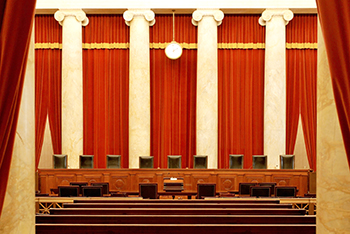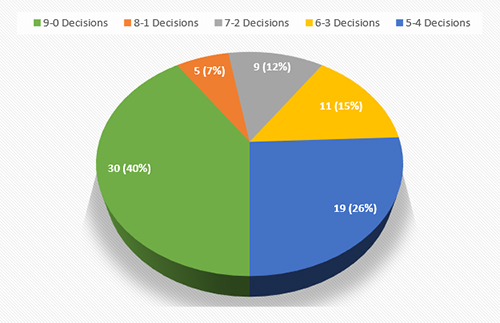 Aug. 19, 2015 – The U.S. Supreme Court ended its term in June, customarily saving the most high-profile cases for last, including decisions on same-sex marriage, capital punishment by lethal injection, redistricting, health insurance subsidies, and more.
Aug. 19, 2015 – The U.S. Supreme Court ended its term in June, customarily saving the most high-profile cases for last, including decisions on same-sex marriage, capital punishment by lethal injection, redistricting, health insurance subsidies, and more.
This article provides statistics and summaries, with some insights from legal commentators. First, we turn to SCOTUS Blog’s final “Stat Pack for the 2014 Term,” which includes a ton of statistical information about the high court’s work.
In all, the Court released 74 merits opinions.
Thirty cases (40 percent) were unanimous 9-0 decisions (down from 66 percent last year), and 19 cases (26 percent) were 5-4 decisions (up from 14 percent last year).
But only 15 of the 5-4 decisions were swing-vote splits between the so-called “liberal” and “conservative” justices, defined by the political party of the President who appointed them.
Justice Anthony Kennedy was the swing vote in 13 cases. In eight cases, Kennedy, appointed in 1988 by Ronald Reagan, sided with the bloc of justices appointed by a Democratic President: Justices Ruth Bader Ginsburg (Bill Clinton), Stephen Breyer (Bill Clinton), Sonia Sotomayor (Barack Obama), and Elena Kagan (Barack Obama).
In five cases, Kennedy sided with the justices appointed by a Republican President: Chief Justice John Roberts (George W. Bush) and Justices Antonin Scalia (Ronald Reagan), Clarence Thomas (George H.W. Bush) and Samuel Alito (George W. Bush).
In two others cases, Justice Thomas and Chief Justice Roberts were the swing voters, siding with the liberal bloc that is Breyer, Ginsburg, Sotomayor, and Kagan.
Merit Cases by Vote Split

Seventh Circuit
Three cases were on review from the U.S. Court of Appeals for the Seventh Circuit, which includes Wisconsin, and the court issued reversals in all three. One, Kingsley v. Hendrickson, originated in the U.S. District Court for the Western District of Wisconsin and involved a pretrial inmate who alleged jail officers used excessive force against him.
The U.S. Supreme Court held, in a 5-4 decision (liberal bloc + Kennedy), that pretrial detainees need only show that an officer’s use of force was “objectively unreasonable,” not that officers were subjectively aware that they were using unreasonable force.
UCLA law professor Richard M. Re wrote that, in time, the case “might look like a pivotal moment when the Court began the project of adopting objective reasonableness standards more broadly, including – perhaps – in the Eighth Amendment context.”
Same-Sex Marriage
The Court’s blockbuster decision on same-same sex marriage came on June 26. In a 5-4 decision (liberal bloc + Kennedy) in Obergefell v. Hodges, the Court held that same-sex couples have a fundamental right to marry under the U.S. Constitution.
 Joe Forward, Saint Louis Univ. School of Law 2010, is a legal writer for the State Bar of Wisconsin, Madison. He can be reached by email or by phone at (608) 250-6161.
Joe Forward, Saint Louis Univ. School of Law 2010, is a legal writer for the State Bar of Wisconsin, Madison. He can be reached by email or by phone at (608) 250-6161.
Same-sex marriage became legal in Wisconsin in September 2014, when the U.S. Court of Appeals for the Seventh Circuit struck down gay marriage bans in Wisconsin and Indiana and the U.S. Supreme Court later declined to hear the appeal.
However, the U.S. Supreme Court took up the question of same-sex marriage in Obergefell, which challenged bans in Michigan, Kentucky, Ohio, and Tennessee.
“Demonstrating that the Supreme Court may rule but may not always command, the process of making same-sex marriage available nationwide is still unfolding, some six weeks after the Justices decided in its favor,” wrote Lyle Denniston for SCOTUS Blog.
“Political resistance is developing in many places, but the legal process is moving ahead – state by state – to make same-sex marriage a reality,” Denniston wrote.
For instance, a county clerk in Kentucky has refused to issue same-sex marriage licenses there on religious grounds, prompting legal steps to compel adherence to the U.S. Supreme Court’s same-sex marriage ruling by court order.
Health Care Subsidies
Advocates at the High Court
U.S. Solicitor General Donald B. Verrilli, representing the U.S. Government, appeared seven times before the U.S. Supreme Court this term, the most of any advocate.
Four other attorneys, including Edwin Kneedler, all appeared four times this term. Kneedler, deputy solicitor general, has appeared before the U.S Supreme Court 129 times during his career, the most of any practicing lawyer.
In King v. Burwell, the Court ruled (6-3) that the federal Patient Protection and Affordable Care Act allows individuals to claim tax credits if they purchase health insurance on a federal exchange, in addition to exchanges established by the state.
Health law attorney Barbara Zabawa of the Center for Health Law Equity, McFarland, said about 34 states, including Wisconsin, have federally facilitated exchanges for people to purchase health insurance, and about 90 percent receive tax subsidies.
“The fear was a decision in the opposite direction would make insurance for about 6.4 million nationally ineligible for subsidies, and many more people would now be uninsured. That will not happen now,” said Zabawa in a recent video interview.
First Amendment
Around the same time that South Carolina removed the Confederate flag from its Capitol grounds, the U.S. Supreme Court ruled 5-4 (liberal bloc + Thomas) that the Texas Department of Motor Vehicles did not violate a group’s free speech rights by refusing to issue specialty license plates featuring a Confederate battle flag.
On the same day, the court ruled 9-0 that an Arizona town violated the free speech rights of a church group by placing restrictions on certain outdoor church signs, concluding the provisions at issue were unconstitutional “content-based regulations.”
“As a combined result of [these] two new rulings, government both gained added power to speak for itself but faced the loss of some of its power to control what others may say in public displays,” Denniston wrote for SCOTOS blog. “And the meaning of the First Amendment, in general, became somewhat more confusing.”
Finally, in Elonis v. United States, an 8-1 majority overturned the conviction of a man accused of violating federal law by posting threatening rap lyrics on Facebook, including a desire to kill the wife who left him, shoot kindergartners, and harm an FBI agent.
Elonis argued that he was only exercising his free-speech rights and there was no evidence that he ever intended to harm anyone. Eight justices agreed that the federal criminal law requires a mental awareness of the crime beyond negligence.
“The ruling overturning his conviction was based solely on the premise that he was convicted without proof that he knew what he was writing and that the ordinary meaning of his words would be a threat,” Denniston wrote, noting some “unanswered questions” still linger on this issue.
Redistricting
In Arizona State Legislature v. Arizona Independent Redistricting Commission, the Court ruled 5-4 (liberal bloc + Kennedy) that transferring redistricting power from the state legislature to an independent redistricting commission was not unconstitutional.
To Talk or Not to Talk
Justice Scalia, appointed in 1986, was the most vocal justice at oral arguments in 2014-15, asking an average of 22 questions per argument. Justice Thomas remained characteristically silent, asking no questions in any argument during the entire term.
In 2000, to address partisan gerrymandering, Arizona voters initiated and adopted a state constitutional amendment that removed the legislature’s power to draw congressional and state legislative redistricting lines, which define voting districts.
Arizona is among 18 states that allow voters to directly initiate constitutional amendments without approval from the state legislature. Wisconsin is on the other end of the spectrum. A constitutional amendment requires introduction of a legislative bill, passage by two consecutive legislatures, and voter approval by referendum.
The Wisconsin Legislature controls the redistricting process, which occurs every 10 years, resulting in recent challenges by voters alleging partisan gerrymandering.
In any event, the Arizona Legislature challenged the redistricting commission’s authority with respect to congressional redistricting under the Elections Clause of the U.S. Constitution, which says legislatures shall prescribe the time, place, and manner of holding elections. But a Court majority upheld the independent commission and the people’s power to “stymie attempts to curb partisan gerrymandering, by which the majority in the legislature draws district lines to their party’s advantage.”
At SCOTUS Blog, attorney Amy Howe said the decision “gives voters a new tool to minimize the circumstances in which the party which controls the state legislature draws congressional district boundaries in a way most favorable to it.”
Death Penalty
In Glossip v. Gross, the Court’s final decision of the term, a 5-4 majority (conservative bloc + Kennedy) rejected the claims of death row inmates in Oklahoma who argued that use of the sedative midazolam for legal injections, in a dose of only 500 milligrams, violated the Eighth Amendment, which prohibits cruel and unusual punishment.
Midazolam is a sedative, not a barbiturate traditionally used to render a person “insensate to pain” as a first step in the three-drug protocol for lethal injections.
In an opinion by Justice Samuel Alito, the majority held that “the prisoners failed to identify a known and available alternative method of execution that presented a substantially less severe risk of pain.” In a dissenting opinion, Justice Stephen Breyer questioned whether the death penalty, in any form, is unconstitutional.
The Los Angeles Times said Breyer’s dissent, joined by Justice Ginsberg, “opened the door to what could become a historic challenge to the death penalty itself.”
Interestingly, last week the Connecticut Supreme Court ruled that allowing death row inmates to be executed is unconstitutional. Connecticut abolished the death penalty in 2012, but the law still allowed executions for those on death row when the law passed.
Other Notable Cases
Michigan v. Environmental Protection Agency. The Court ruled 5-4 (conservative bloc + Kennedy) that the “cost” of regulation and compliance to a power plant, under the Clean Air Act, is a relevant consideration in determining whether it is “appropriate and necessary” for the Environmental Protection Agency to regulate the plant’s emissions.
Holt v. Hobbs. The Court ruled 9-0 that the Arkansas Department of Corrections violated the federal Religious Land Use and Institutionalized Persons Act by prohibiting Muslim inmates from growing beards as part of a sincerely held religious belief.
Williams-Yulee v. Florida Bar. The Court ruled 5-4 (liberal bloc + Roberts) that a Florida law banning the personal solicitation of campaign funds by judicial candidates does not violate the First Amendment.
